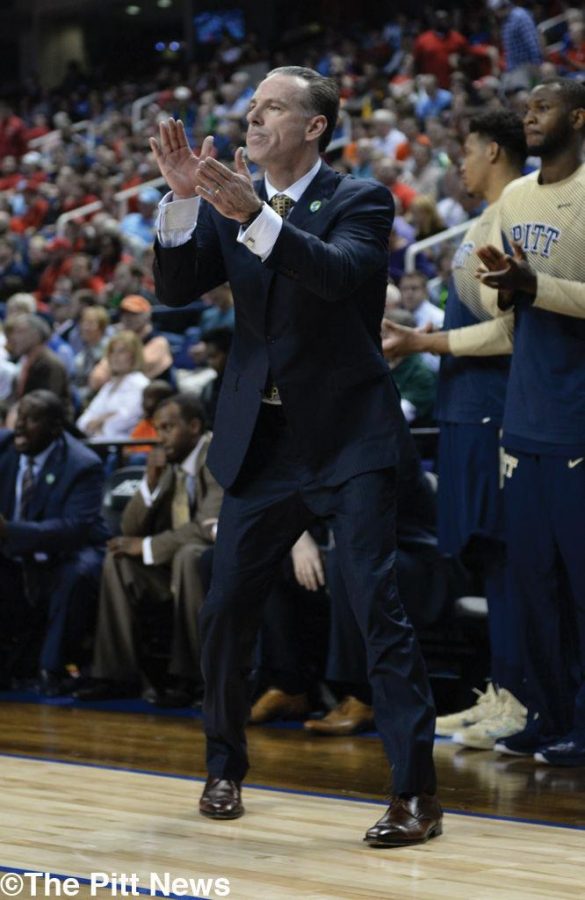Dixon’s extended tenure should not go unappreciated
March 16, 2015
Jamie Dixon could have gotten out of dodge, if the slew of reports two springs ago gained any credence.
The then-48-year-old Pitt men’s basketball head coach could have escaped the frigid winters of western Pennsylvania for the warm coastline of the University of Southern California, a short drive from his birthplace in North Hollywood.
Instead, Dixon stayed in Oakland, inking a 10-year contract with Pitt that ended any speculation about his employment status.
But, after this display of loyalty, which came after an extended display of coaching prowess, Dixon — who sports the highest winning percentage in Big East history — still isn’t enough for a small upwelling of Pitt fans, even after 12 years.
The arguments against Dixon are simplistic and invalid, discounting the extended period of dominance that Dixon brought to a previously middling basketball program.
“No Final Fours! No recent success! He can’t recruit!”
The Final Four critique unfairly diminishes the success that the Panthers have seen under Dixon. In a single-elimination tournament of 64 teams, making the semi-finals isn’t an indication of coaching ability, but rather an indication that the team is firing on all cylinders.
Too many times, coaches bare the brunt of the blame for these postseason losses, while players avoid most of the culpability.
Dixon wasn’t defending Villanova’s Scottie Reynolds coast-to-coast, game-winning layup in the 2009 Elite Eight. Dixon wasn’t the one who committed a foul on Butler’s Matt Howard in 2011.
Instead, Dixon’s contributions have led Pitt to the program’s first two No. 1 seeds in its history. He’s won two Big East regular season titles and one Big East tournament title — and was a Kemba Walker crossover away from a second. I prefer to judge a coach based on a large sample size of season-long success rather than one bad game at tournament time.
As for Pitt’s recent “struggles,” the fact that some consider Dixon’s two worst seasons — this year and 2011-2012 — disappointing is a testament to his success.
Dixon set an NCAA record for the most victories by any coach in the first eight seasons with 211. To expect that kind of sustained excellence to continue at a school like Pitt, one without any recent history of consistent winning in basketball, is asking for something that’s nearly impossible.
Also, dismissing Pitt’s last four years as disappointing is a gross misrepresentation. Dixon’s teams have made the NCAA tournament two of those four years, which would have been widely welcomed during Pitt’s eight-year-long March Madness drought from 1994-2001. Dixon fostered such a period of consistency that even the slightest deviation has left some of the Panther faithful craving more.
Perhaps the greatest fallacy of all is the notion that Jamie Dixon has been a mediocre recruiter of talent. This is a claim with little basis, unless solely based on his 2014 class, in which he only brought in two low-tier recruits, Ryan Luther and Cameron Johnson.
Dixon is two years removed from landing the biggest commitment of his career, the 7-foot center Steven Adams from New Zealand, a consensus five-star recruit who was ranked the sixth-best player in the 2012 class.
Throw in Pitt’s first McDonald’s All-American Dante Taylor, another five-star commit in Khem Birch, who decided to transfer in the midst of his freshman year, as well as a litany of recent four-star recruits like Michael Young, James Robinson and Lamar Patterson.
It isn’t easy to recruit at a school like Pitt, whose surrounding areas aren’t exactly a hotbed for basketball talent, but Dixon has managed to overcome this obstacle with his skills in player development.
Dixon develops talent over four years, somewhat of a lost art in today’s era of one-and-dones. During his tenure, Adams and DeJuan Blair are the only two players to leave Pitt early for the NBA. To have the kind of success without the top-tier NBA talent that many other schools boast furthers Dixon’s reputation as an elite cultivator of talent.
To fire Jamie Dixon would be to fire the face of a program, to fire a man who shifted expectations for Pitt basketball from middling to eternally optimistic. It would be an irreversible step in the wrong direction for the program. Hopefully, the minority that wants him ousted remains a minority.



